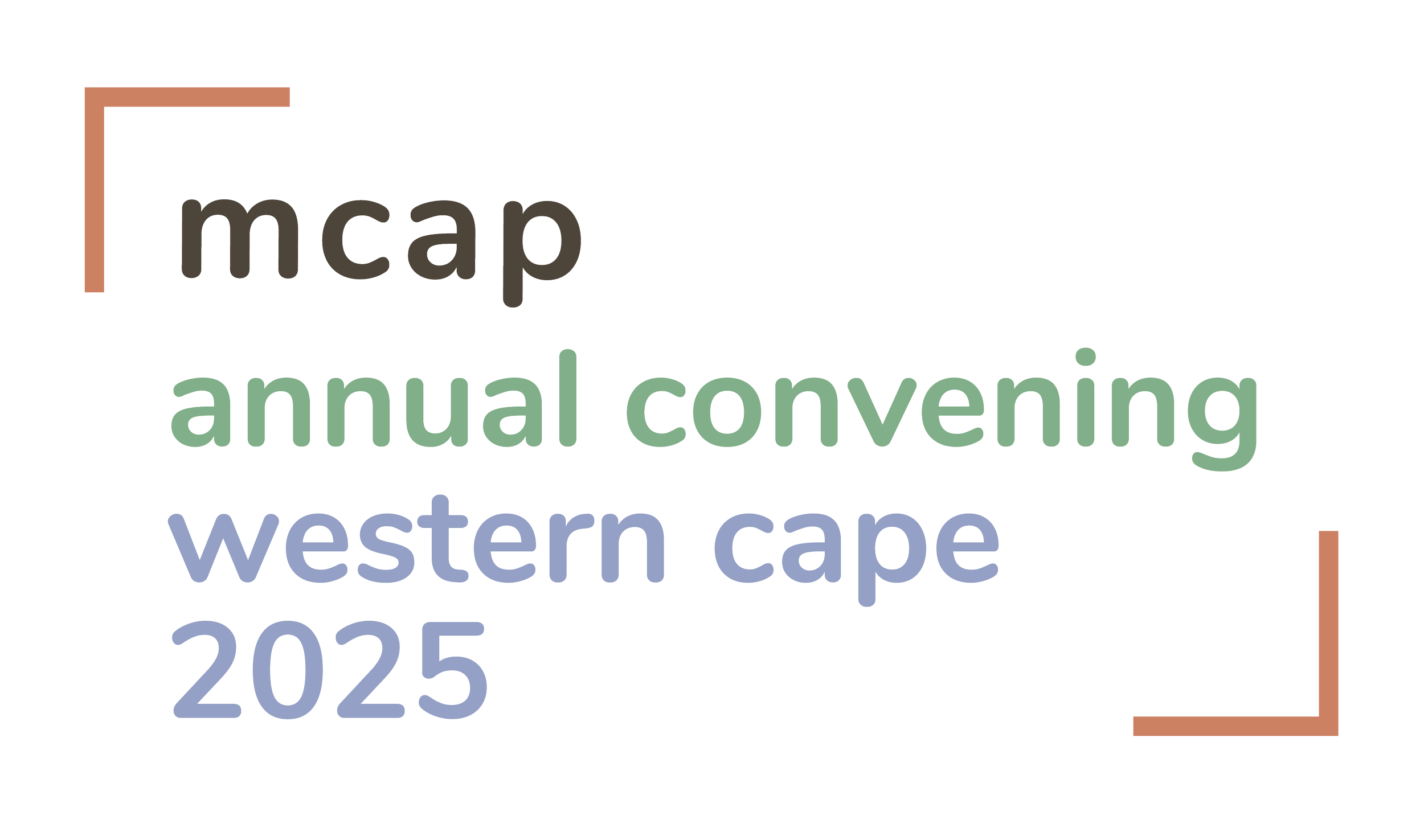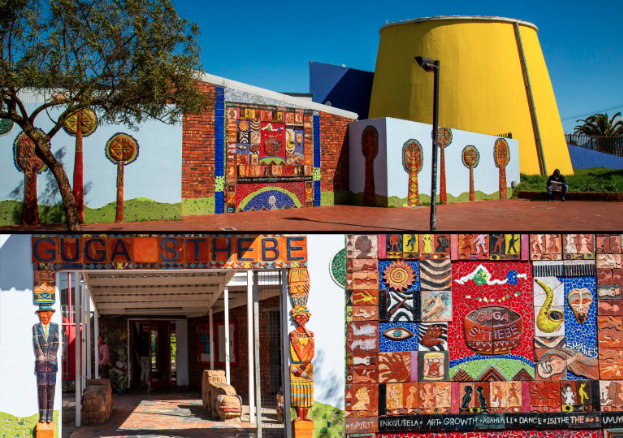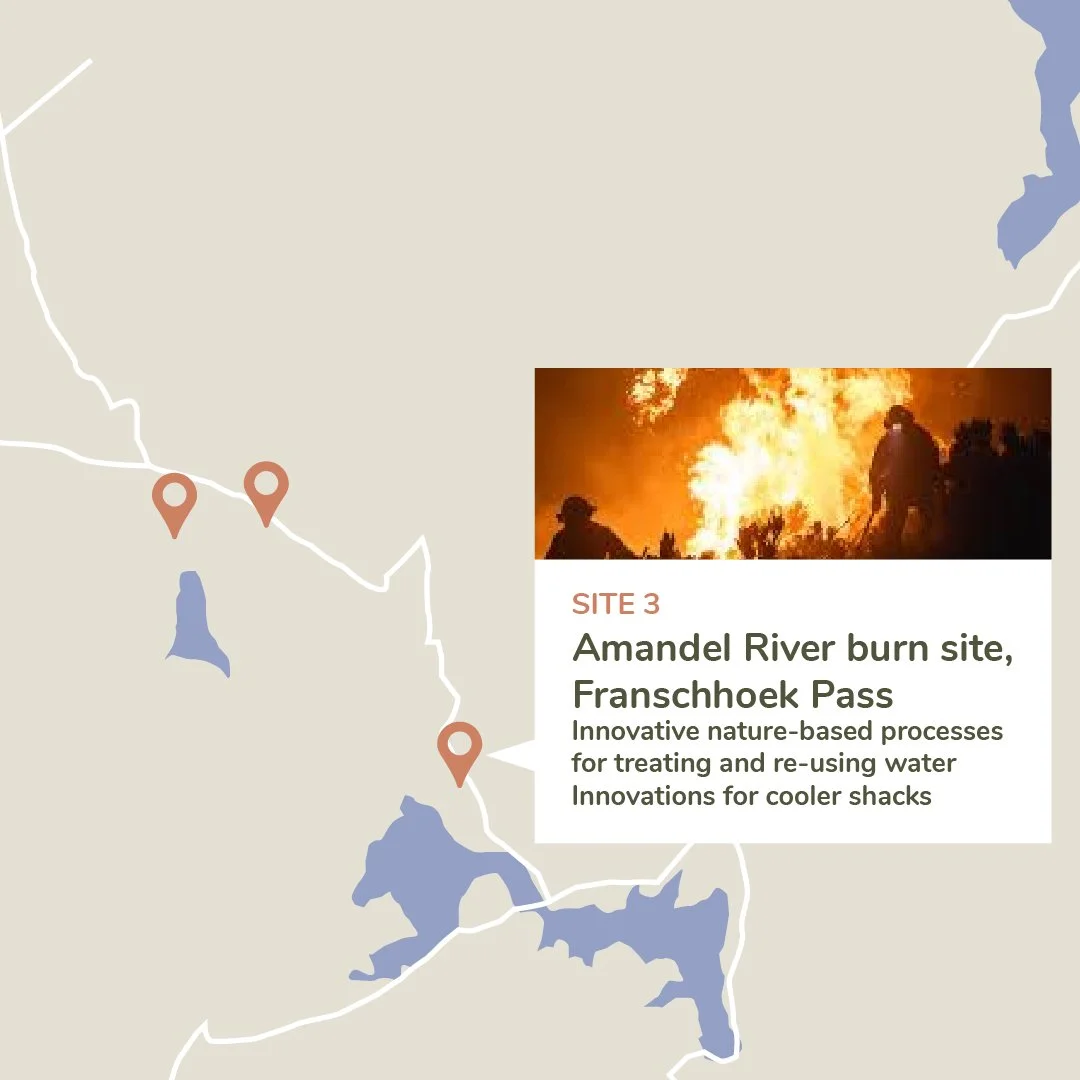
2nd MCAP Annual Convening
Western Cape, May 6 - 9, 2025
Living Lab Overview Western Cape
May 6-7, 2025
Living labs are demonstrations of programs, policies or projects within a territory that help practitioners to understand the history and origins of local resilience challenges, their current status and critical actors, and help practitioners to envision a stronger future by considering new solutions or approaches.
The Western Cape, Stellenbosch, Jonkershoek, and Berg River Valley Living Lab of the MCAP Annual Convening will serve four primary purposes:
Immerse MCAP members in Western Cape’’s overall resilience narrative - and elevate the region’s risks and on-the-ground solutions and opportunities
Uplift projects, policies and programs underway in Western Cape that illustrate diverse approaches to tackling climate risk and underlying vulnerabilities
Provide an opportunity to elevate important local resilience leaders from diverse sectors
Inspire attending MCAP members with new insights and tactics that can inform their climate resilience work as a collective and back at home
Over the course of two days, MCAP members will have the opportunity to hear from an array of local experts working together to tackle the region’s challenges at the nexus of drought, extreme heat, and wildfire.
A NOTE ON ATTIRE:
On Tuesday, 6th May, we will be traveling by bus, starting from Stellenbosch Techno Park to Leeuwenhof Residence, then onto the Cultural Centre in Langa, and back to Stellenbosch. As we will spend some time outdoors on a walking tour, please bring along some comfortable walking shoes to change into.
On Wednesday, May 7th we will be traveling via bus to multiple locations and spending considerable time outdoors. Please dress in comfortable, casual clothing and wear comfortable walking shoes.
Tuesday, May 6th
8:30 - 10:30
Protea Hotel Technopark Stellenbosch
Registration
Registration will be open in the morning to allow time to pick up all materials, including name badges, tote bags with local gifts, and other items for the event.
Please wear
MC for Bus 1: Mr Phil McLean, Control Environmental Officer: Water Resource Rehabilitation and Bioremediation, Western Cape Department of Environmental Affairs & Development Planning
MC for Bus 2: Mr Rudolph Röscher, District Manager LandCare (Cape Winelands), Sustainable Resource Use and Management, Western Cape Department of Agriculture
10:30 - 11:45
En route in bus
Transit from Stellenbosch Techno Park to Leeuwenhof Residence will depart at 10:30
En route the City’s Disaster Risk Management will provide a talk that focuses on dealing with Climate Change related events such as risk of fire, floods and extreme heat in informal settlements.
Speaker: Ms Charlotte Powell, Portfolio Head: Public Awareness and Preparedness , Disaster Risk Management Centre
12:00 - 13:30
Leeuwenhof Residence
19:30 - 21:00
Protea Hotel Technopark Stellenbosch
Welcome Lunch at Leeuwenhof
You will be welcomed by the Premier of the Western Cape and his senior management at his official residence Leeuwenhof in Cape Town. Finger lunch will be served.
12:00 - 12:15 Welcome Remarks
Premier Alan Winde, Premier of the Western Cape
12:15 - 12:30 Responding Remarks
Secretary Wade Crowfoot, Secretary, California Natural Resources Agency
Sonsoles Letang, Director General for Climate Change and Environmental Quality, Catalan Government
Sam Carter, MCAP Secretariat, Founding Principal, Resilient Cities Catalyst
14:00 - 16:30
Langa Township
Langa Township & Guga S'thebe Arts & Culture Centre
Welcome from Councillor Lwazi Phakade, Councillor, Ward 51, City of Cape Town
Tour of the Langa Township
Drumming Demonstration and Crafts Market
Tour Guide: Mr Alfred Magwaca, Langa Heritage Tours and Projects
Heat Action Planning Presentation
Speaker: Ms Amy Davison, Head Climate Change, Risk and Resilience Department, Future Planning and Resilience Directorate
Resources:
Fire Risk Reduction to Reduce Spread in Informal Settlements
Smoke Alarms for Informal Settlements: Monitoring and Challenges from a Large‑Scale Community Rollout in Cape Town, South Africa
Heat Rise Detector & Client Fire Stories (Lumkani)
Cape Town Heat Wave Educational Materials
16:30 - 18:00
En route in bus
Transit from Langa Township to Protea Hotel Technopark Stellenbosch
18:00 - 19:30
Protea Hotel Technopark Stellenbosch
Local Culture Tasting: Rooibos Tea & Wine
Rosa Kruger, Founder, The Old Vine Project of South Africa
Mientjie Mouton, Founder and Managing Director, Carmién Teas
Welcome Dinner
Wednesday, May 7th
7:15 – 7:25
Protea Hotel Technopark Stellenbosch
Living Labs Site Visits
Meet in front for a 7:30 departure. Please wear casual attire with comfortable walking shoes and bring your umbrella, jacket, or other layers for variable weather conditions.
Register on WhatsApp group for the day before getting on the bus (bring your phone with enough data and charge).
MC for Bus 1: Mr Phil McLean, Control Environmental Officer: Water Resource Rehabilitation and Bioremediation, Western Cape Department of Environmental Affairs & Development Planning
MC for Bus 2: Mr Rudolph Röscher, District Manager LandCare (Cape Winelands), Sustainable Resource Use and Management, Western Cape Department of Agriculture
7:30 – 8:45
En route in bus
Welcome and Living Lab introduction
Objectives:
Stellenbosch, Jonkershoek, Berg River Valley: Climate change in the Western Cape
Strategic Water Source Areas
Western Cape Water Supply System (WCWSS)
Building water resilience in the face of droughts and floods
Ecological Infrastructure
Speakers:
Prof Guy Midgley, Director of the School for Climate Studies, Stellenbosch University
Prof Stephanie Midgley, Specialist Scientist: Climate Change, Western Cape Department of Agriculture
Mr Phil McLean, Control Environmental Officer: Water Resource Rehabilitation and Bioremediation, Western Cape Department of Environmental Affairs & Development Planning
Ms Karen Shippey, Chief Director Environmental Sustainability, Western Cape Department of Environmental
Resources:
Western Cape Climate Adaptation Pathway
Western Cape Climate Change Response Strategy (WCCCRS): Vision 2050
WCCCRS Implementation Plan (2023)
State of Climate Change Mitigation Responses Report (2024-25)
Water for Sustainable Development in the Berg Water Management Area (South African Journal of Science)
Defining South Africa’s Water Source Areas (WWF 2013)
Water Resilience Strategy (Western Cape Government)
Cape Town Water Strategy (City of Cape Town)
Cape Town Drought Crisis Communications
Table Mountain Water Resource Partnership
Day Zero: One City’s Response to a Record
9:00 - 10:00
Berg River Dam, Franschhoek
Living Lab Site 1
Objectives:
Integrating engineered and nature-based solutions for water resource management
History of the Dam, Integration into WCWSS
Forestry exit, tree clearing & ecological water release
Role in Day Zero drought, water resilience, and Water Users’ perspectives
Speakers:
Mr Mkhevu Mnisi, Director, National Department of Water and Sanitation
Mr Rudolph Röscher, District Manager LandCare (Cape Winelands), Western Cape Department of Agriculture
Ms Eurica Scholtz, CEO of the Berg River Water Users’ Association
Resources:
Berg River Dam Factsheet
Berg River Dam Waterwheel
Berg River Water Project
Water for Sustainable Development in the Berg Water Management Area (South African Journal of Science)
10:00 - 10:30
En route in bus
Objectives:
Introduction to the Water Hub: a Research and Innovation Living Lab
Speakers:
Mr Phil McLean, Control Environmental Officer: Water Resource Rehabilitation and Bioremediation, Western Cape Department of Environmental Affairs & Development Planning
Ms Karen Shippey, Chief Director Environmental Sustainability, Western Cape Department of Environmental Affairs & Development Planning
10:30 - 11:30
The Water Hub, Franschhoek
Living Lab Site 2
Objectives:
Innovative nature-based processes for treating and re-using water
Response to extreme heat - Innovations in cooler shacks
Speakers:
Prof Kevin Winter, Department of Environmental and Geographical Science, University of Cape Town
Joined by Franschhoek youth
Resources:
The Water Hub
Water Hub Brochure (2025)
Water Outlook Report (October 2020)
Advancing Sustainability Through Living Labs: The Water Hub as a Case Study (Journal of African Studies and Sustainable Development)
Water for Sustainable Development in the Berg Water Management Area (South African Journal of Science)
11:30 - 12:55
Franschhoek
Lunch
Restaurant at Rickety Bridge Wine Estate
12:55 - 13:35
En route in bus
Objectives:
Introduction to wildfires and fynbos + biodiversity, including fauna
Climate change and wildfire risk
Urban-wildland interface challenges
Integrated wildfire management
Speakers:
Bus 1: Prof Guy Midgley, Director of the School for Climate Studies, Stellenbosch University
Bus 2: Mr Patrick Shone, Integrated Catchment Specialist: Disaster & Climate Response, CapeNature
Resources:
Nature-Based Solutions Are Protecting Cape Town’s Water Supply (TNC)
Western Cape Agricultural Sector Profile (2023-24)
LandCare Initiative (Western Cape Government)
13:35 - 14:30
Amandel River burn site, Franschhoek Pass
Living Lab Site 3
Objectives:
Planned use of fire for fuel management, invasive alien tree control (water security)
Integrated fire management tools
Welcome and introductions: Mr Patrick Shone, Integrated Catchment Specialist: Disaster & Climate Response, CapeNature; and Ms Kirsten Watson, Greater Cape Town Water Fund Manager at The Nature Conservancy, SA.
Speakers:
Ms Kirsten Watson, Greater Cape Town Water Fund Manager at The Nature Conservancy, South Africa
Mr Nkosinathi Nama, Greater Cape Town Water Fund Implementation Coordinator, The Nature Conservancy, South Africa
Supported by Ms Louise Wessels, Manager Greater Overberg Fire Protection Association
Resources:
Fire Management (Cape Nature)
Greater Overberg Fire Protection Association
Amandel River Campaign (Love Green Communications)
Amandel River: The Benefits of Burning
Amandel Burn Map
Amandel Catchment Wildfires
14:30 – 15:30
En route in bus
Objectives:
Theewaterskloof Dam and Day Zero drought, competition for water
The SmartAgri Plan
Climate change risks and impacts in the export horticultural sector
Sector responses to drought/flood, extreme heat, fire
Speakers:
Bus 1: Dr Ilse Trautmann, Deputy Director-General, Western Cape Department of Agriculture
Bus 2: Prof Stephanie Midgley, Specialist Scientist: Climate Change, Western Cape Department of Agriculture
Resources:
Theewaterskloof Dam Fact Sheet
Theewaterskloof Dam History (Riviersonderend)
Green Agri (Western Cape Government)
The Future is Education (HortGro)
SmartAgri Plan (2016)
SmartAgri Plan Update (2022)
15:30-16:30
Kromco Packhouse, Grabouw
Living Lab Site 4
Objectives:
The private sector’s role in building climate resilience in export-oriented fruit/wine production
Welcome and introductions: Mr Paul Clüver Jr, Managing Director of Paul Clüver Family Wines
Supported by Dr Paul Clüver Sr, and Ms Karin Clüver, Production Manager Apples and Wine Grapes
Resources:
Municipal Economic Review and Outlook: Cape Winelands District (2023)
De Rust Case Study
South African Wine
South African Wine Research Projects (2024)
Clüver Wines
Fresh Quarterly (2023)
Fresh Quarterly (2024)
16:30 – 17:45
Return to Protea Hotel Technopark, Stellenbosch










